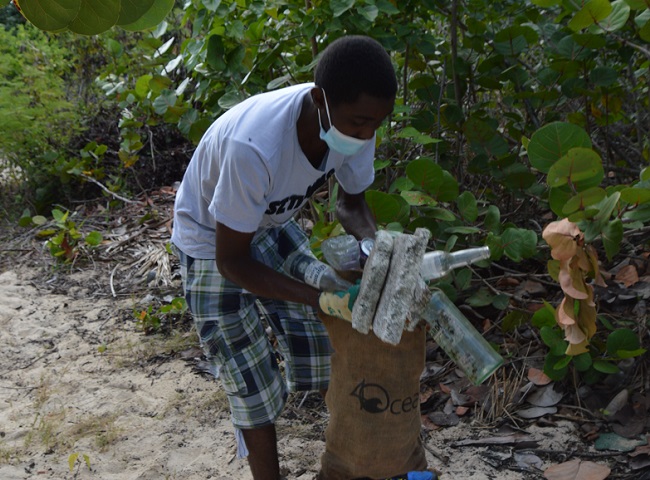PHILIPSBURG, Sint Maarten — The Nature Foundation St. Maarten is joining as a contributor in a new project ‘In-No-Plastics’, a European Union-funded global initiative. In-No-Plastic focuses on innovative approaches towards the prevention, removal, and reuse of marine plastic litter (plastic debris that ends up in the ocean). On St. Maarten the project will focus on litter clean-ups around the island, monitoring the effectiveness of clean up methods, using clean-up software apps, testing the water, enhancing the blue economy and expanding outreach and educational activities. The In-No-Plastic project will run for the remaining two years on St Maarten.
“Plastics are a visible problem on and around St. Maarten, however not all of the plastics are easily seen. Large pieces of plastic ending up in the environment may break down into smaller pieces, but they will never biodegrade, they will continue as invisible micro plastics in the environment and especially in the ocean. With this project we will be able to increase the number of beach clean ups and events to pick up more larger plastics (macro plastics) off the beaches and shorelines of St. Maarten. As we cannot see the microplastics, we are not aware of the extent of the micro plastic problem in our waters. The water testing will assist us to better understand the magnitude of the problem and effectiveness of decreasing marine plastic litter,” explained Alice Manley Project coordinator for In-No-Plastics on St. Maarten.
In-No-Plastic is a three-year EU funded project within the Horizon 2020 framework programme, the goal is to develop and demonstrate nano-, micro-, and macro-plastic clean-up technologies in the aquatic ecosystems. This project approaches various social and technical strategies targeting the industrial hot spots through cooling water systems, harbours, lagoons, shores and the shallow sea water. Social strategies will be focused on St. Maarten, comprising of using an incentive-based initiative that relies on crowdsourcing. One such example is a smartphone app, produced by Empower, to help individuals record the amount of litter picked up, with incentives for the user.
“We are very fortunate to be part of this EU funded project ‘In-No-Plastics’. The project will be great for St. Maarten, as reduction of plastics in our surroundings and marine ecosystem is much needed. Plastics can have a detrimental effect on marine and terrestrial life, and the Nature Foundation is grateful to work towards reducing those effects,” stated Melanie Meijer zu Schlochtern manager of the Nature Foundation St. Maarten.
Keeping in line with the duties of the In-No-Plastics project, the Foundation will continue to host and attend macro plastic clean-ups around the island. Additionally, the Foundation will monitor and test ocean and lagoon water for microplastics every six months. The results from this water testing will show if the amount of microplastics in the water reduces at the same rate as the macro plastics which are removed during clean-ups. Given the increased focus on clean-ups and single-use plastic education, the Foundation hopes to see a reduction in both large and small pieces of plastic. The Foundation will also work towards enhancing blue economy activities on St. Maarten to increase individual cleanup efforts.
This project is particularly timely given the movement towards the new single-use plastic ban on St. Maarten. The single use plastic ban focuses on replacing plastic shopping bags, plastic straws, and Styrofoam to-go containers with more sustainable options. The Nature Foundation is excited to expand the education and outreach efforts towards students, residents, and tourists about the effects of plastic on the environment, and how they can reduce their plastic footprint.
An association of 17 partners and 10 different countries in Europe and the Caribbean make up the In-No-Plastics project, which includes 2 research institutions, 2 Government bodies, 4 industry end users, 2 NGO, 7 SMEs of which 4 technology and 3 service providers. The Nature Foundation will work alongside the Dutch Caribbean Nature Alliance (DCNA), a participating partner with In-No-Plastics.
To learn more about this project, you can check out the website innoplastic.eu. You can also follow the Nature Foundation on social media to keep up-to-date with our work and learn when future clean-ups will occur. If you are interested in joining the Nature Foundation’s volunteer list to receive emails about volunteer opportunities, visit the contact us page on the foundation website naturefoundationsxm.org.




























